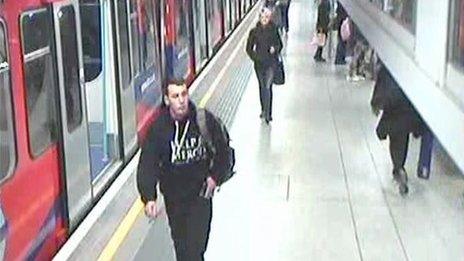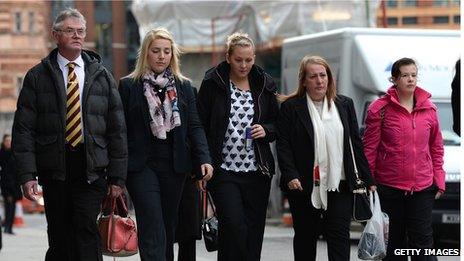Lee Rigby trial: Killing 'cowardly and callous', court hears
- Published
The BBC's June Kelly: "The jury has been shown CCTV footage of the car hitting Lee Rigby"
The killing of soldier Lee Rigby in Woolwich, south-east London, was a "cowardly and callous murder", the Old Bailey has heard.
It was told that Michael Adebolajo, 28, and Michael Adebowale, 22, drove at Fusilier Rigby before attempting to decapitate him on the street close to his barracks on 22 May.
Both are also accused of attempting to murder a police officer and conspiracy to murder a police officer.
They both deny all charges.
'Like a butcher'
There were gasps in court as CCTV footage was shown of Fusilier Rigby being rammed by a car and thrown into the air and onto the bonnet.
The footage showed the soldier walking along the street wearing a Help for Heroes hoodie and a backpack, before the car veered across a carriageway, hitting him from behind.

CCTV footage showed Fusilier Rigby at Woolwich station shortly before the attack
The jury was then shown images from two CCTV cameras of the two men dragging the unconscious Fusilier Rigby's body into the road, stopping traffic.
The two defendants arrived at court amid tight security and appeared in a glass-lined dock in the Old Bailey courtroom with paper on one side to restrict their view.
Members of Fusilier Rigby's family attended as the prosecution made its opening statement.
The soldier's mother Lyn Rigby left the court in tears as the prosecutor told jurors they were about to see her son's final moments.
Prosecutor Richard Whittam QC told jurors that the two suspects drove a Vauxhall Tigra "straight at" Fusilier Rigby at about 30-40mph.
He said: "Both men then dragged his body into the middle of the road. They wanted members of the public to see the consequence of what can only be described as their barbarous acts.
"They had committed, you may think, a cowardly and callous murder by deliberately attacking an unarmed man in plain clothes from behind, using a vehicle as a weapon, and then they murdered him and mutilated his body with that meat cleaver and knives."
Mr Adebolajo tried to decapitate the soldier with a meat cleaver with "multiple blows to his neck", while Mr Adebowale stabbed and cut him, the jury heard.
Mr Whittam said it appeared that Mr Adebolajo "made a serious and almost successful attempt to decapitate" Fusilier Rigby.
An eyewitness described three blows.
Another witness, Gary Perkins, described the defendant's actions as being "like a butcher attacking a joint of meat", the prosecutor said.
At the same time, Mr Whittam said, Mr Adebowale "was using a knife to stab and cut at the soldier's body".
The jury heard that a woman, Vikki Cave, approached Fusilier Rigby's body as others were comforting him to see if she could help and she heard Mr Adebolajo talking about religion.
"He was "saying things about religion such as 'these soldiers go to our land, kill/bomb our people - so an eye for an eye, a tooth for a tooth'," Mr Whittam said.
Ms Cave asked Mr Adebolajo if they were safe, and he responded that women and children were but they should keep back when the police and soldiers arrive.
The jury were shown a mobile phone video clip of Mr Adebolajo with blood on his hands, saying Fusilier Rigby was killed "because Muslims are dying daily by British soldiers".
And the jury heard that he handed a hand-written note to Amanda Donnelly Martin attempting to justify the attack by saying it was in retaliation for "oppression" of people in Muslim countries.
Mr Whittam told the jury that "to seek out and to kill political opponents on the grounds that you say that they have oppressed your countrymen or people of your religion is still murder".
He said "disputes have to be settled by lawful means, not retaliation".
'Children turned back'
The court heard that the men were also armed with a gun which was used to scare off members of the public before the emergency services arrived.
As the police drove into Artillery Place, where the incident had taken place, Mr Adebolajo raised the meat cleaver above his head and moved towards the vehicle.
Mr Whittam said that meanwhile, Mr Adebowale ran along the side of a wall and aimed the gun - which it was revealed was not loaded - at officers.
Both men were then shot by the police and arrested.
The jury heard Mr Adebolajo sustained a wound to his upper left bicep, and Mr Adebowale had wounds to his thumb, abdomen and thigh.
While he was being treated by paramedics, Mr Adebolajo said: "Your government is all wrong. I did it for my God. I wish the bullets had killed me so I can join my friends and family," Mr Whittam said.

Members of Fusilier Rigby's family were in attendance
Both men have admitted possession of a firearm with intent to cause fear of violence.
Praising the "bravery" of the public, Mr Whittam described how one woman went to Fusilier Rigby's lifeless body and "stroked him to provide some comfort and humanity to what had unfolded", while others went to see if they could provide first aid.
A woman spoke to Mr Adebolajo "despite the fact that he was still holding the meat cleaver and his hands were covered in blood", the jury heard.
More details about the suspects' movements in the lead-up to the attack were also outlined.
The jury heard that on the day before the attack, Mr Adebolajo bought a five-piece set of kitchen knives from a branch of Argos in Lewisham, south-east London - some of which were used in the attack.
Mr Adebolajo, from Romford, east London, has asked to be known as Mujaahid Abu Hamza in court, and Mr Adebowale, from Greenwich, south-east London, wants to be known as Ismail Ibn Abdullah.
Wrapping up his statement, Mr Whittam said that Fusilier Rigby had not been in military uniform when he was attacked - as Mr Adebolajo had told police officers - and he was attacked from behind.
The trial continues on Monday.
- Published29 November 2013